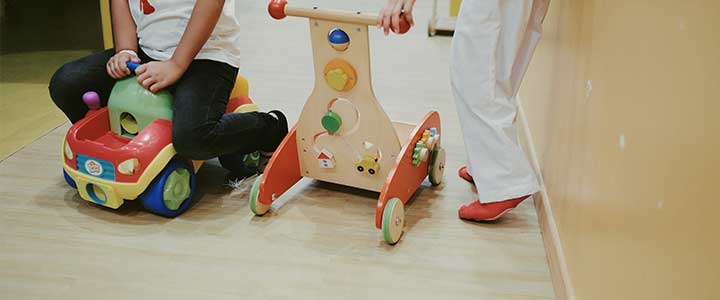Join our July intake for CAE’s Special Education programmes.
Read moreJuly 2024 Intake: CAE’s Special Education


Join our July intake for CAE’s Special Education programmes.
Read more
Play Therapy is an intervention strategy to help children safely communicate and express their feelings and thoughts naturally in order to deal with trauma, loss, delayed development, and other developmental and social issues. Play therapy is fun, free-flowing, non-directed, and effective.
Play therapy allows people who are experiencing emotional or behavioural issues to open up their emotions in the safe space of the ‘playroom’, where they are allowed to face their thoughts and emotions nonverbally.

Have you ever caught yourself or someone else saying, “Will my child grow out of it?” Many times, adults and educators tend to think that the child may have behaviour issues. The common signs that lead to that conclusion are:
Read more
We don’t often attribute meaning to how children play or even what they decide to play with. They seem to always have their preference for the things that they do. Especially at a younger age, they may not even be able to tell us why specifically they do certain things. Especially in early childhood trauma cases, the child may indeed not talk much at all and instead opt to do their thing in silence.
Read more
The demand for educators who are equipped with the necessary skills and knowledge to create an inclusive environment for their students has never been higher.
Inclusive education is education that makes consideration for and understands the needs of students’ differences and diversity whether those are physical, emotional, social, or academic. Students, regardless of any challenges they may have, should be placed in appropriate education classes so they are able to receive high-quality instruction, intervention, and support that enable them to succeed. Students should feel welcomed and comfortable in the environment and are supported throughout their education.
Read more
Autism Spectrum Disorder (ASD) can be diagnosed as early as 18 months but professionals will suggest parents monitor and wait until age 3. Parents will actually predict their child’s later autism spectrum disorder long before any professional diagnosis. According to a 2009 research (J Dev Behav Pediatr. 2009 Oct; 30(5): 367–375.),
Read more
Children who suffer from communications disorders suffer emotional and social effects that may be a huge quality of life issue for them. Speech therapy is used to help improve your child or your students’ ability to communicate. Spoken communications is incredibly important to the development of the child, allowing them to express their emotions, needs, and thoughts.
In a research report by Jan Broomfield & Barbara Dodd (Speech Therapy 4 Kids), children who received intervention and underwent speech therapy improved over those that did not:
Children with primary speech and/or language disorder who received therapy over 6 months made statistically more positive change in standard scores on widely used speech–language therapy assessments than children held on a waiting list without treatment
There are other benefits of speech therapy:
1. More Independence:
When a person suffers from communications disorders, they often do not have the ability to fully communicate their needs or feelings. They often have to rely on other people to interpret communications and guess on their behalf. Therapy can help in dealing with the issues causing the disorder, giving them the ability to independently communicate intent, desire and feelings.
2. Better Socialisation:
The ability to properly communicate with other people within society allows individuals to build connections to their community and other people, opening up a whole new world of activities and interactions that would have otherwise been closed off. This also allows individuals to find their place with their peers in society.
3. Higher Self Esteem:
When people feel they can’t do things by themselves, have little to no place within society and amongst their peers, their value in themselves drops considerably. Low self esteem in such situations can further isolate individuals from society, their family and even putting them on a self-destructive path. Increasing a person’s self esteem will give them confidence and self value, allowing them to go out into the world to experience it positively.
If your child has difficulties with their speech and language abilities, they will have difficulty engaging peer group conversations, and if left untreated, further complications will arise by the time they pass their teens and enter adulthood.
This 6-months* part-time Professional Certificate in Speech Therapy Assistant (PCSTA) programme is designed to train potential Speech Therapy Assistants to support children and adults with communication and swallowing disorders or ailments.
You will gain the tools to assist in the assessment, screening and treatment of communication and speech disorders to help affected children and adults gain their independence and improve the quality of their lives.
CALL US at 6533-0031
EMAIL your enquiry to ENQUIRY@ICAE.EDU.SG
or Register for your free preview below:

Dyscalculia is often overshadowed by Dyslexia. As a result, not many people have heard of it, nor really know what it is.
Read more
Every parent dreads having to receive a call from school about their child misbehaving. Whether it is getting into fights, inattentiveness during class or having bad grades, it can be frustrating for parents if they do not understand the reasons behind the child’s behaviour.
Read more
Especially at a young age, children are not always able to properly vocalise the complexity of their feelings or the thoughts they have. When the child is unable to do so, therapy can sometimes grind to a standstill and end in frustration for the child, making recovery from traumatic events even harder.
Read more